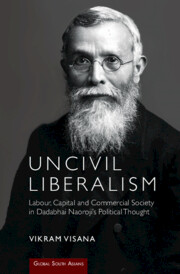Book contents
- Frontmatter
- Dedication
- Contents
- List of Abbreviations
- Acknowledgements
- Introduction
- 1 Sociality in an Imperial and Industrial Age
- 2 Sociality and the Parsis of Western India
- 3 Civil Society and Social Reform
- 4 Conceptualizing the Drain Theory
- 5 Making Commercial Society in India
- 6 Making Commercial Society in Britain
- 7 The Afterlives of Naoroji’s Political Thought
- Conclusion
- References
- Index
6 - Making Commercial Society in Britain
Published online by Cambridge University Press: 27 September 2022
- Frontmatter
- Dedication
- Contents
- List of Abbreviations
- Acknowledgements
- Introduction
- 1 Sociality in an Imperial and Industrial Age
- 2 Sociality and the Parsis of Western India
- 3 Civil Society and Social Reform
- 4 Conceptualizing the Drain Theory
- 5 Making Commercial Society in India
- 6 Making Commercial Society in Britain
- 7 The Afterlives of Naoroji’s Political Thought
- Conclusion
- References
- Index
Summary
On 3 December 1893, Dadabhai Naoroji returned to Bombay with great fanfare as an elected member of the House of Commons. Up to half a million Indians had gathered to congratulate India's Grand Old Man for his successful election to London's Central Finsbury constituency the previous year. Naoroji's successful contesting of a parliamentary seat was undoubtedly a milestone in British and Indian history; nevertheless, this chapter avoids a detailed retelling of Naoroji's wrangles with the British press, the party system and the issue of cultural ‘performance’ within colonialism's representational order. This has been covered extensively by other scholars, focuses overmuch on identity and leaves the agency of Indian ideas underdetermined. This chapter traces the reception and use of Naoroji's political thought within the relevant British social debates of the day. It was in the discrete context of British political argument that Naoroji was appreciated as a political thinker rather than simply a cultural curiosity. Naoroji used his prominence as the first Indian MP to intervene in the British liberal and radical canon, arguably leaving a subtler and longer lasting legacy than the symbolism of his short three-year term as an MP.
Naoroji entered British electoral politics immediately after the 1884 Reform Act which had prompted liberals and conservatives to compete for the working-class vote in London. Troubled by this democratic shift, middle-class anxieties around poverty, character and the partial enfranchisement of the ‘residuum’ were catapulted to the heart of British political debate. The last quarter of the nineteenth century also saw the burgeoning of the labour movement and new unionism as rising prices and wage cuts culminated in the Cotton Lockout of 1887 and the Great London Dock Strike of 1889. Much of the working-class politics expressed in major newspapers like Reynolds continued to articulate radical concerns in the language of ‘Old Corruption’ and a critique of the state rather than through the language of class war. While London's new radical and labour associations advocated an attack on privilege and monopoly, they also persisted with the non-conformist and ‘puritanical’ tradition of radical reformism. The latter strain was frequently characterized by the sort of public moralism exemplified by the Temperance Movement.
- Type
- Chapter
- Information
- Uncivil LiberalismLabour, Capital and Commercial Society in Dadabhai Naoroji's Political Thought, pp. 150 - 183Publisher: Cambridge University PressPrint publication year: 2022



